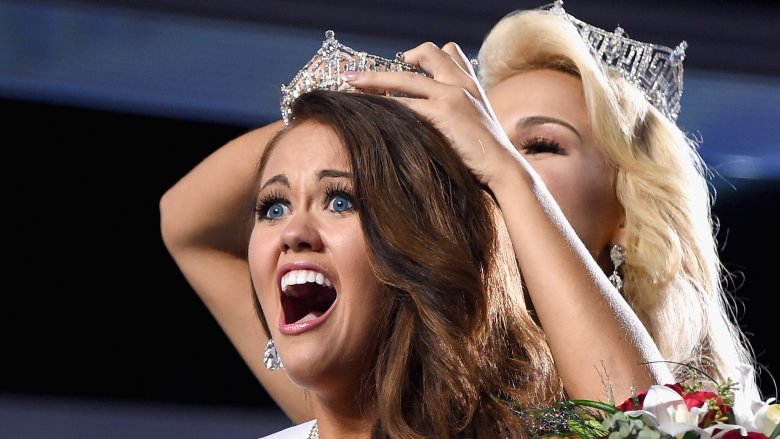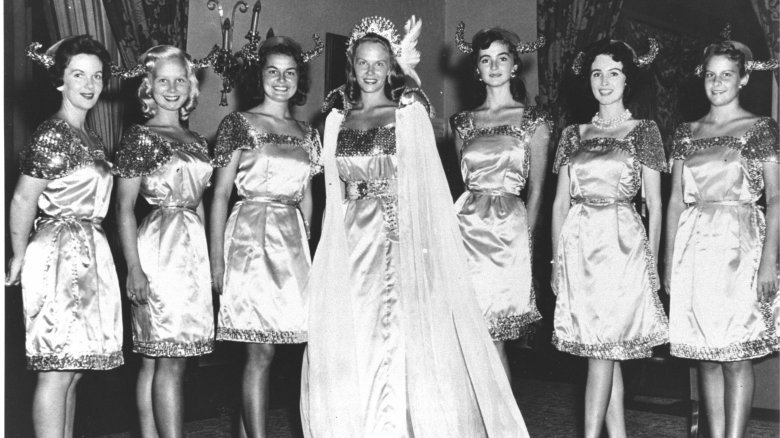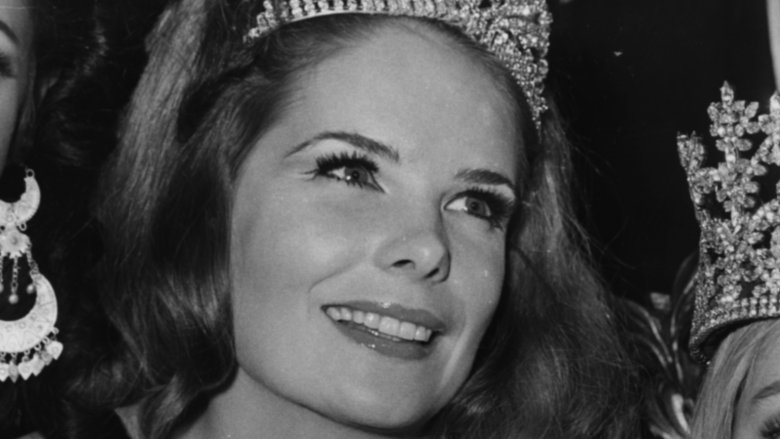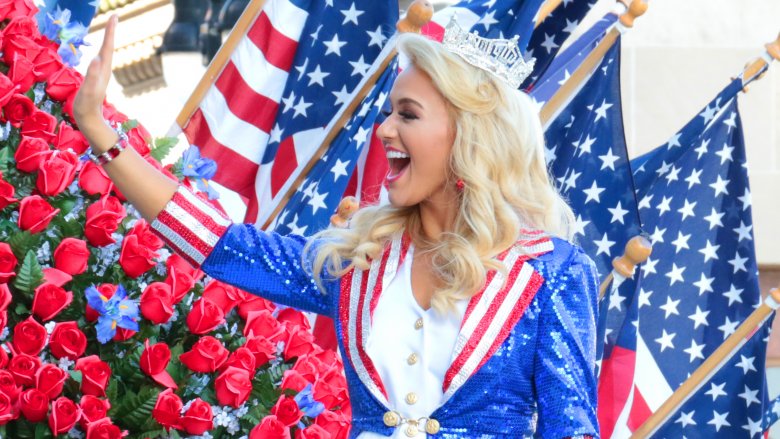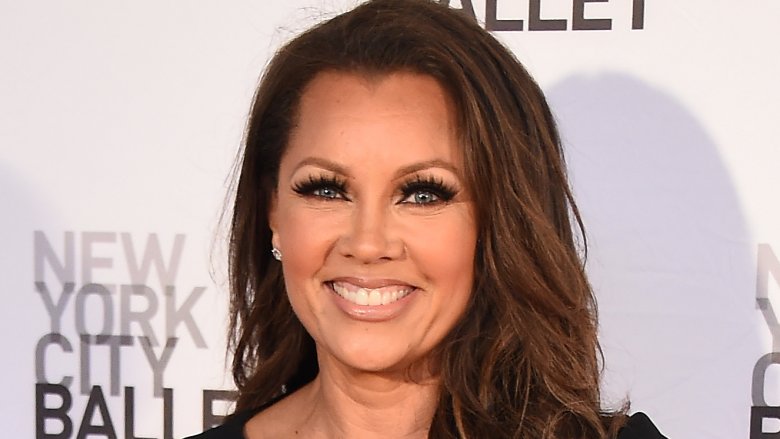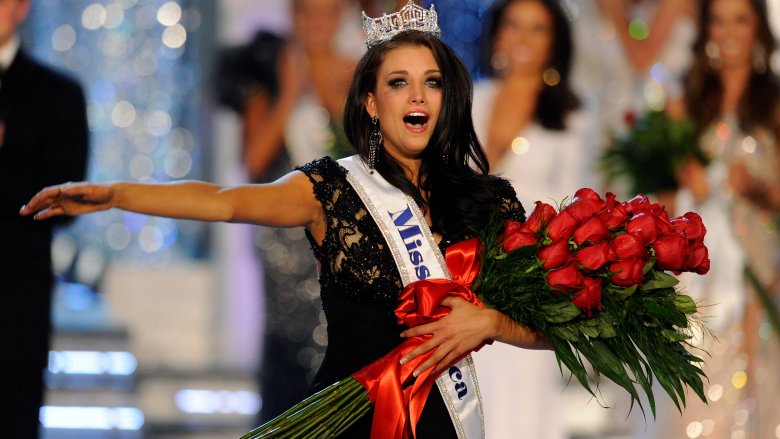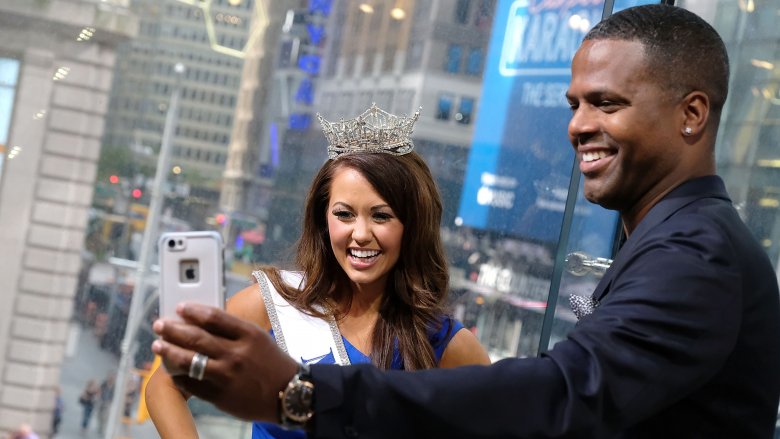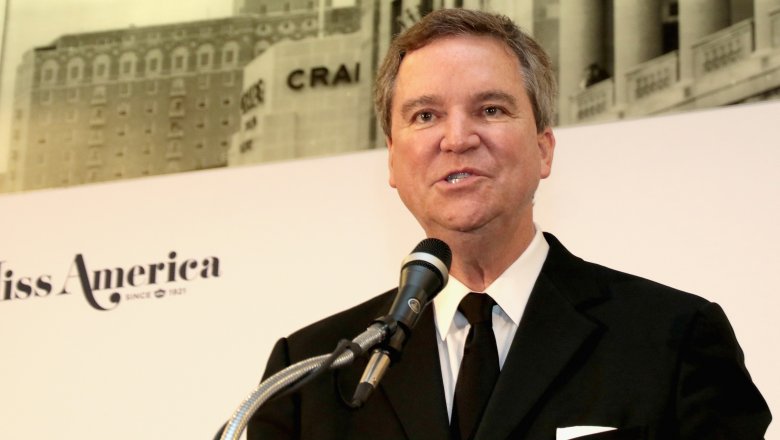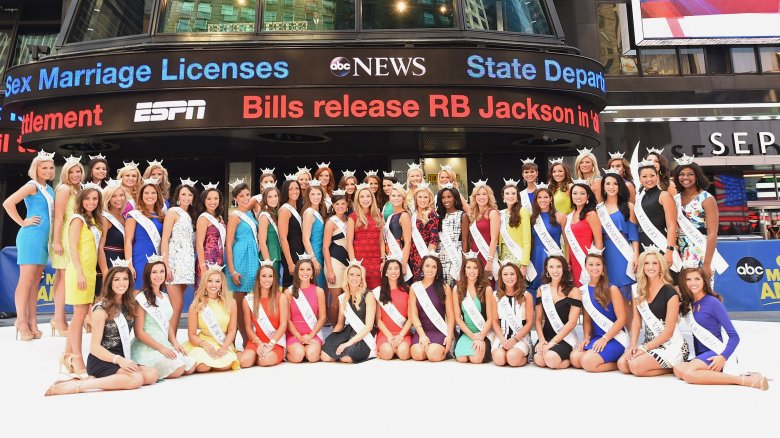The Untold Truth Of Miss America
The Miss America pageant is approaching its 100th birthday, and the competition is showing its age in more ways than one. While the organization paints itself as a platform for female empowerment, many have criticized it as a product of a bygone era.
For something that appears so outwardly wholesome, it may initially seem weird that the pageant has attracted so much protest–until you consider all the complaints about what goes on behind-the-scenes. Critics rarely lambast specific contestants. Instead, it's the platform as a whole that's been accused of being racist, sexist, paternalistic, commercial, and even militaristic.
The Miss America Organization faced one of its biggest crises yet in late 2017. The revelation of hateful emails and alleged smear campaigns against former contestants from the company's highest-ranking members is making the entire pageant seem slimy and perhaps untenable in the empowering #MeToo era.
This is a major moment for the competition, but it's not the pageant's first controversy. Read on to find out everything you need to know about the sordid untold truth of Miss America.
A boardwalk business plan
The Miss America Pageant reportedly began as an outgrowth of a "glittering parade with 350 maidens in gaily-decorated rolling chairs" in Atlantic City, N.J. in September 1920–an event designed to drum up business along the shore after Labor Day.
The following year, the Businessmen's League of Atlantic City devised the idea of holding an "Inter City Beauty" contest. According to the Miss America website, "Newspaper organizations decided to sponsor photographic popularity contests from among their readership and awarded their respective winners with an all expense paid trip to the Second Annual Fall Frolic." According to the site, contestants were evaluated "based on their general appeal in appearance, personality, conversations with the judges, and interactions with the crowds."
Except for a stretch between 1928 and 1932, when the country was rocked by the Great Depression, the pageant has continued ever since.
Miss (White) America
One of the ugliest and most unforgivable aspects of Miss America's past involves its history of explicit racism. Until 1940, the organization specified in its rules that "contestants must be of good health and of the white race." According to Fox News, "To satisfy this requirement, Miss America hopefuls were required to trace their ancestry back through as many generations as they could."
The first black contestant in the pageant did not compete until 1970. When black people were featured in the competition prior to that milestone, they were reportedly depicted as dancing slaves.
Beyond codifying discrimination into its early practices, the organization also apparently did nothing to protect contestants of marginalized races from discrimination and prejudice. In fact, it arguably reinforced prejudice through its inaction. According to the Jewish Women's Archive, the first Jewish-American pageant winner, Bess Myerson, was encouraged by organizers to change her last name to something less identifiably Jewish. She refused. "Three of five sponsoring companies withdrew their support from her post-pageant tour, and there was little demand for Myerson on the speaker circuit frequented by past winners," the Archive reported.
Pro-war propaganda
Another one of the top issues on protesters' agendas in 1968 was the pageant's ties to the to the U.S. military and particularly the war in Vietnam.
"Miss America as Military Death Mascot," read the press release promoting the demonstration. "The highlight of her reign each year is a cheerleader-tour of American troops abroad to pep-talk our husbands, fathers, sons and boyfriends into dying and killing with a better spirit."
Vanessa Williams is forced to resign
One of the best examples of the pageant's history of paternalistic sexism happened when 1984's winner, Vanessa Williams, was forced to resign her crown by the organization.
Williams, the first African-American woman to win the competition, was nearly finished with her tenure as Miss America when nude photos of her taken prior to the pageant were published in a magazine without her consent. Williams faced public shaming, harassment, and ridicule for the incident.
In 2015, Miss America CEO Sam Haskell issued an apology to the Grammy and Tony-nominated star. "You have lived your life in grace and dignity, and never was it more evident than during the events of 1984 when you resigned," he said (via Variety.) "Though none of us currently in the organization were involved then, on behalf of today's organization, I want to apologize to you and to your mother, Ms. Helen Williams. I want to apologize for anything that was said or done that made you feel any less the Miss America you are and the Miss America you always will be."
That public apology now rings hollow following the publication of some of Haskell's private emails. More on that in a minute.
A 'walking commercial'
Despite all the high-minded talk of Miss America as some sort of moral and educational icon, the competition has been criticized for making money on the backs of its talented contestants for decades.
In a 1968 protest, critics claimed Miss America was nothing more than a "walking commercial" for the Pageant's sponsors. "Wind her up and she plugs your product on promotion tours and TV—all in an 'honest, objective' endorsement. What a shill."
The big scholarship myth
The Miss America Pageant's biggest selling point–and its shield against criticism–has been its self-proclaimed status as the world's largest provider of scholarships for women. However, according to a scathing segment on Last Week Tonight with John Oliver in 2014, the pageant's big claim is egregiously exaggerated.
According to the report, though the organization claimed $45 million was made "available" to contestants annually, it only distributed $482,000 in 2012. In other words, the organization never technically claimed to actually shell out all those "available" millions. Further, the segment revealed the organization, on the state level, falsely claimed to have doled out millions of dollars in scholarship donations.
It's one thing for the pageant to require its contestants to be childless and unmarried if they want to win, but to not even give participants their promised rewards feels like a no-win situation.
Reality TV steals the spotlight
The pageant's popularity with participants and audiences began to wane around the turn of the century as reality television emerged and took over the market. ABC stopped airing the contest in 2005, relegating Miss America to basic cable from 2006 to 2011. The pageant also relocated the show from its original home in Atlantic City to a smaller venue in Las Vegas from 2006 to 2014.
However, the contest began to stage a comeback in recent years, returning to broadcast television and to Atlantic City under the guidance of CEO Haskell. Under his leadership, the organization teamed up with Dick Clark Productions to secure vital financial support and promotional opportunities.
The pageant's resurgence, however, has since been halted by a scandal that could destroy its future...
Hatred behind the scenes
In December 2017, The Huffington Post published a bombshell article revealing that the highest members of the Miss America organization spoke about former contestants and pageant winners behind their backs in language that was insulting, hateful, and crude.
Three years' worth of leaked emails reportedly demonstrated that top executives, including CEO Haskell, lead writer Lewis Friedman, and board members Tammy Haddad and Lynn Weidner, had also allegedly targeted and antagonized former winners. Some messages reportedly wished death upon contestants. Others indicated that high-level members of the organization may have changed pageant rules to target 2013 winner Mallory Hagan's lucrative pageant coaching business.
Board member Haddad reportedly referred to the pageant's past winners as a "pile of malcontents and has beens who blame the program for not getting them where they think they can go," reported The Huffington Post.
The fallout
Dick Clark Productions severed ties with the organization after reportedly learning about the email scandal, and an overwhelming number of former Miss Americas called for high-level resignations. Haskell resigned, as did COO Josh Randle and Board Chair Lynn Weidner.
The interim chairman of the board, Dan Meyers, posted a statement on Twitter thanking "Lynn and Sam for many years of tireless work for, and significant financial support to, both the Miss America Organization and thousands of young women who received millions of dollars of educational scholarships from the Organization as a direct result of their efforts."
At the time of this writing, it remains to be seen what will happen to the pageant, or what the long-term impacts of the scandal will be. Miss America winners and contestants may remain role models to many, but the organization that crowns them has a long way to go to fix its tarnished reputation.

